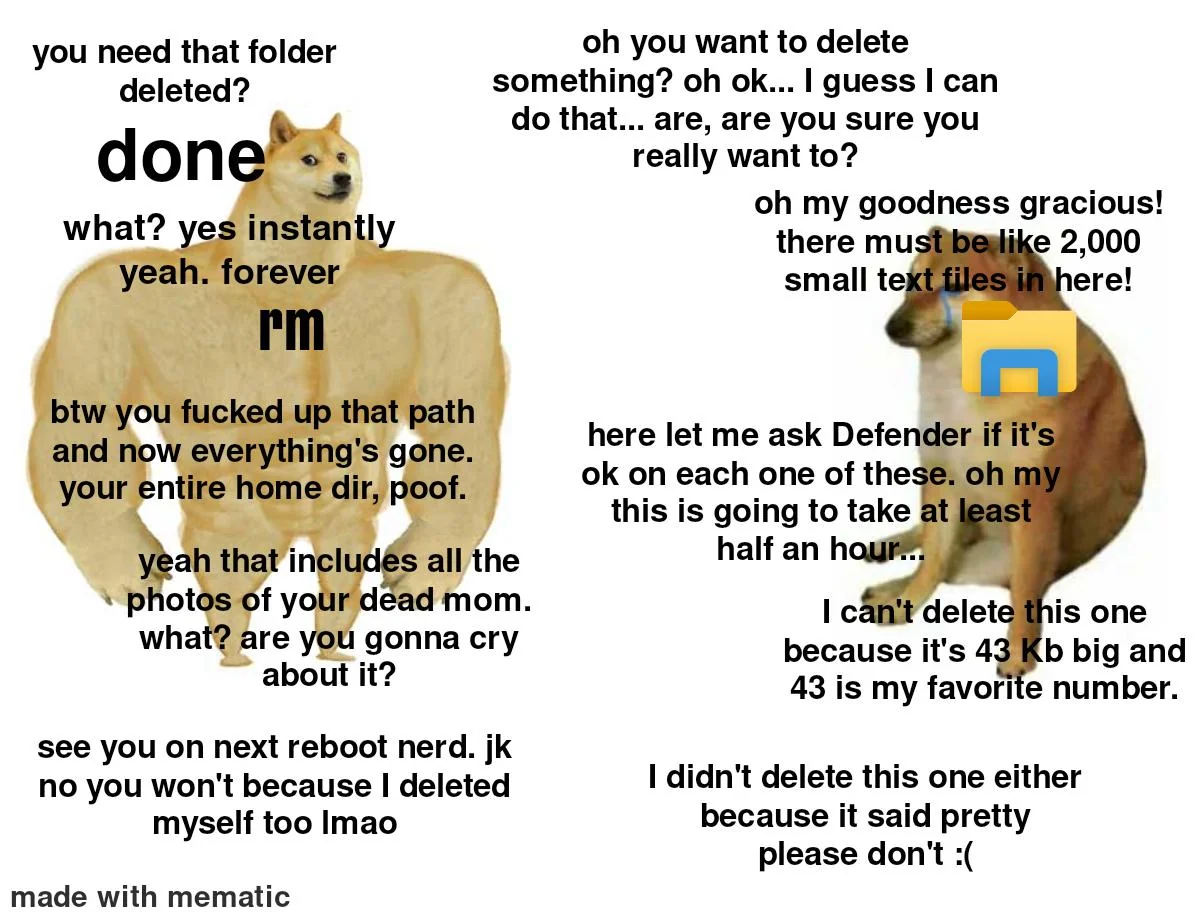backups / btrfs snapshots
linuxmemes
I use Arch btw
Sister communities:
- LemmyMemes: Memes
- LemmyShitpost: Anything and everything goes.
- RISA: Star Trek memes and shitposts
Community rules
- Follow the site-wide rules and code of conduct
- Be civil
- Post Linux-related content
- No recent reposts
Please report posts and comments that break these rules!
the linux-file-deletion is used as a example for good software design. It has a very simple interface with little room for error while doing exactly what the caller intended.
In John Ousterhout's "software design philosophy" a chapter is called "define errors out of existence". In windows "delete" is defined as "the file is gone from the HDD". So it must wait for all processes to release that file. In Linux "unlink" is defined as "the file can't be accessed anymore". So the file is gone from the filesystem immediately and existing file-handles from other processes will life on.
The trade-off here is: "more errors for the caller of delete" vs "more errors due to filehandles to dead files". And as it turns out, the former creates issues for both developers and for users, while the later creates virtually no errors in practice.
doing exactly what the caller intended.
No, no. Exactly what the user told it to do. Not what they intended. There's a difference.
The windows shell has really gone downhill in recent years, with spontaneous file locks and random hangs
It's always the AV...
I never deleted my root system with rm but I did dd go sda instead of sdb and ended up losing my data.
I'm so annoyed when I tell rm to delete a terabyte of data and it's nowhere near instant. I'd have probably gone insane if I was using Windows.
1TB for Windows... depends on file size, but let's presume you have 1TB of Word documents... just hit Enter and go watch the Matrix trilogy.
"what are you trying to tell me? I'll be able to select 'yes' when it asks me if I'm sure I want to delete?"
"No, Neo. I'm saying when you switch to Linux you won't have to."
One of my first experiences with Linux at university was watching a classmate install Slackware, and then (for a laugh) dragging everything into the recycle bin.
They got a passing grade, because the lecturer saw their working installation, but they learned a valuable lesson in Linux that if you delete something, it'll fucking delete it.
I like the windows delete philosophy of asking me before I delete something.
I fucking hate the windows delete philosophy of telling me I don't have access after I said yes.
I'm this close to daily driving as Sadmin
Better would be to delete without confirmation but being able to quickly reverse it with Ctrl+Z
One drive has a trash for the trash. I’m still not convinced those files are gone after the 2nd empty, I think they just don’t show the other trash cans
Outlook on Exchange is like this. You can delete stuff to the Deleted Items directory. If you delete it from there it goes into another area called 'Recover deleted items'.
It's trash cans all the way down.
The cloud is just someone else's trash can
You know what they say, one man's trash...
Is another ones treature
Is another's CLOUD ☝️🤓
GUI file managers generally have "Trash" feature as well.
They usually support one but it is generally not provided by the file manager it's self. This means that assuming that the file managers use the same trash system you can trash a file on one recover it another.
Is that actually true? Does Windows check every file with Defender before deleting it?
Not just every file deleted, every file written to disk as well (downloaded, extracted from an archive, whatever).
It's also how most AV software works, except Defender is slow AF.
I thought it checks every file closed
No, it scans file headers when you do read/write operations on disk. Every AV works this way, except, as I said, Defender is slow AF.
I can't find talk I watched, but I found github issue it was based on.
Short version: Defender is triggered not on open, not on read or write, but on CloseHandle.
Now wonder, which one is will be preferred by people who aren't tech savvy.
They are not likely to be using the terminal. Pretty much every graphical file browser will ask for confirmation upon delete, and many will use a rubbish bin by default.
To be fair, assuming you are not using a wastebasket which comes pre installed in a lot of distros, you still need the right permissions to delete files that belong to the system and if you're using rm you have to use the -rf option to remove a folder and it's contents.
